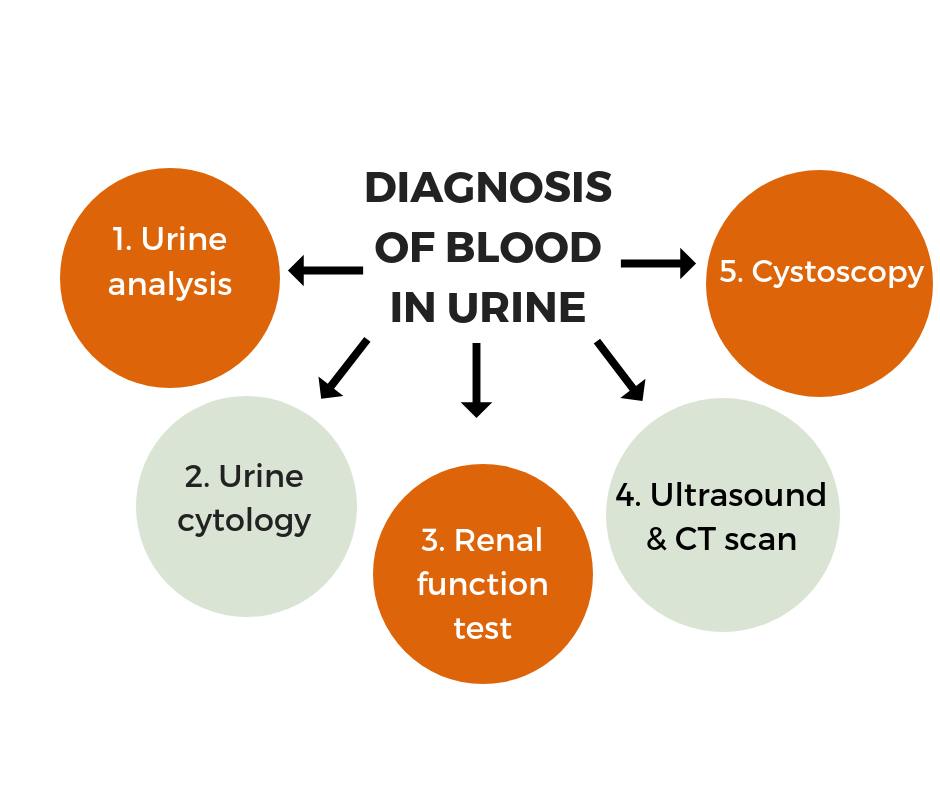Blood in urine is a major cause of concern. You must never ignore it as it may be caused due to underlying damage to your kidneys or urinary tract. Cancers of the urinary tract are the most common cause of blood in urine.
Is blood in urine normal?
Dr. Mayank Uppal, Consultant at Sitaram Bhartia Hospital, Delhi says, “ Any blood in urine can be a sign of danger. So, it’s a good thing to come for a checkup, just to be sure.”
The presence of blood in urine is a condition known as haematuria. When the urine is visibly red, it is called visible or gross haematuria. When the haematuria is not visible with the naked eye, it is called microscopic blood in urine. This is diagnosed only when your urine analysis is done. But in both cases, it is mostly painless.
Finding out the cause of blood in urine
The following tests are often carried out for diagnosing the cause of blood in urine in a person:

3 Reasons You May Have Blood in Urine
Here are the top 3 reasons you might be experiencing haematuria –
(i) Cancer of the urinary tract:
One of the main reasons of having blood in urine is the presence of a cancerous tumour in any part of your urinary tract like the kidneys, ureter, bladder or prostate.
“In fact bladder cancer is one of the most common forms of cancer which affects 2 percent of all men above 40 years of age in India.”
There are different grades and stages of bladder cancer which tells us about the extent to which cancer has spread. When the tumour is restricted to just the surface of the bladder wall in which case it’s known as superficial bladder tumour, it is more manageable as compared to invasive bladder tumour in which case the cancerous cells infiltrate the bladder wall.
The main cause of bladder cancer is smoking and one’s persistent exposure to harmful chemicals.
Is bladder cancer curable?
It can be treated. The treatment depends on the grade and stage of the tumour. For a superficial bladder cancer, a procedure known as Transurethral Resection of Bladder Tumour (TURBT) is used in which the cancerous growth is removed from the bladder lining using a special cutting instrument.

In the case of invasive bladder cancer, complete removal of the bladder becomes necessary to prevent it from spreading further, along with bladder reconstruction using intestine.
(ii) Kidney, ureteric or bladder stone:
Kidney stones are hard deposits of minerals and salts present in the urine and are mostly formed due to lack of water in one’s urine.
“Kidney stones are often sharp and spiky due to which they scratch the inner lining of your kidneys. This causes blood to appear in your urine sometimes,” explains Dr. Mayank.
Apart from blood in urine, other symptoms you might experience if you have kidney stones are:
- A frequent urge to pass urine often
- Vomiting and nausea
- Dull, intermittent pain in lower back or side of the abdomen
- A burning sensation while urinating
When they are small and are diagnosed early, the stones can be easily passed while urinating. But when they are large enough, medical intervention is required.
But overall, kidney stones are mostly harmless if diagnosed early. If they are allowed to stay in the body for long, they might grow and slip into the ureter (tube connecting the kidneys to the bladder) blocking the flow of urine. In that case, they are referred as ureteric stones.
“In case of ureteric stones, surgery becomes inevitable because it is an emergency situation.”
(iii) Prostate enlargement in men:
Haematuria in men is sometimes a sign of an enlarged prostate. Also referred to as Benign Prostatic Hyperplasia (BPH), it’s a common condition in men above the age of 50.
“Prostate is a walnut shaped gland located at the base of the bladder surrounding the urethra (tube that carries urine from the bladder out of the body). The gland grows throughout the life of a man but as age progresses, its size can increase so much that it starts putting pressure on the urethra and obstructs the urine flow,” explained Dr. Mayank.
But how does it lead to blood in urine?
Prostate gland has large blood vessels which can get ruptured when enlarged. This causes haematuria.
It can be cured either by medication or surgery depending on the symptoms of the person and the prostate size.
Lalit’s story of experiencing blood in urine
Lalit Wadhwa, 46, didn’t know what to do when he witnessed blood in his urine one day. After consulting Dr. Mayank he got to know that he had bladder cancer.
Since the tumour was only limited to the bladder lining, Dr. Mayank decided to carry out TURBT to remove the cancerous growth from his lining before it spreads to the rest of the bladder.
Lalit was fine after the surgery.
“I’m glad that I didn’t take my symptom lightly and came for a checkup early. If I had come later maybe cancer would have spread,” Lalit said.
Dr. Mayank advised him to quit smoking altogether and be regular with his follow up visits so that any recurrence of the tumour can be detected early and treated.
Have questions about blood in urine? Come in for a consultation with Dr. Mayank at our hospital in Delhi. Call us at +918800816657.


